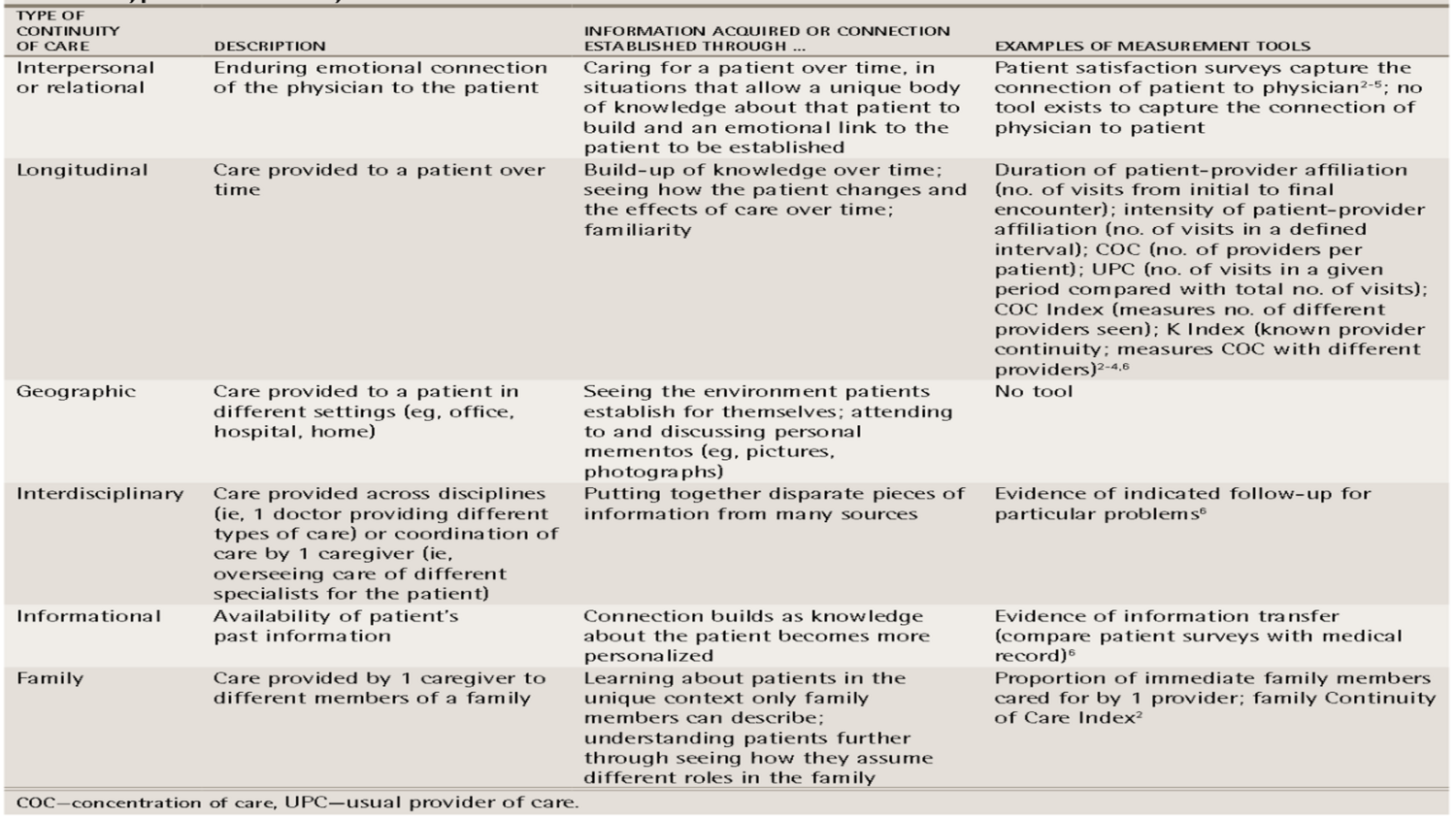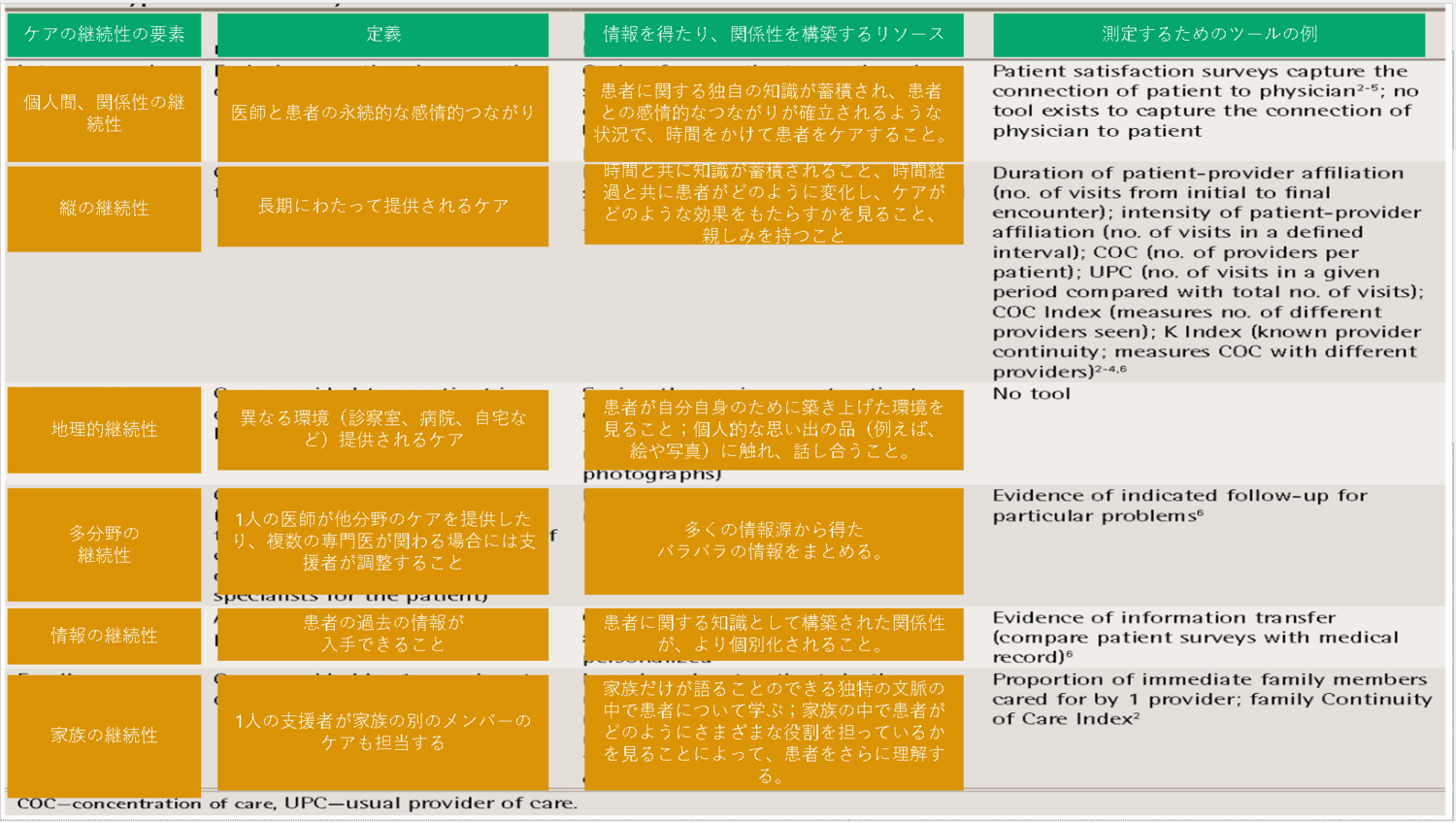Emotional effects of continuity of care on family physicians and the therapeutic relationship
「ケアの継続性が、家庭医や治療関係に与える感情的な影響」
冒頭、Table1でケアの継続性のタイプについての説明がある。

あまり見覚えのない表だったので、一部意訳してみた。
僕自身は継続性というときには、Interpersonal, Longitudinal, Informationalは特に意識している気がする。
Geographic, Interdisciplinary, Familyは、「継続性」を考える文脈ではあまり意識してなかった。これらはACCCCで言うところのCoordination of careや、Comprehensivenessと被っている気がするから、どちらかというとそちらで意識している気がする。
(というか、Comprehensivenessが最も重要であり、その達成のためにContinuityやCoordinationなどがある、というイメージ)
ーーーーーーーーーーーーーーーーーーー
この論文は、継続性の影響を考えるために、家庭医を複数のグループに分けてディスカッションさせ、それをコード分析した質的研究のようだ。
細かいところは読んでないが、結果としては以下のような影響がある。
患者を深く理解すること
Pros
より質の高い診療ができるようになる。
より質の高い診療ができるようになる。
Physicians identified that a deep under- standing of their patients resulted in more efficient and effective care, which led to an enhanced sense of pro- fessional competence. This was the result of an existing working knowledge of their patients, ability to interpret their patients’ nonverbal cues, and the ability to prioritize problems and provide personalized care.
医師は、患者を深く理解することが、より効率的で効果的なケアにつながり、専門家としての能力を高めることにつながると認識した。 これは、患者に関する知識を深め、患者の非言語的な合図を解釈する能力を身につけ、問題に優先順位をつけ、患者一人ひとりに合ったケアを提供できるようになった結果である。
Cons
患者からちゃんと覚えていることを期待されることへの不安。
先入観による誤診の不安。
Some physicians expressed anxiety caused by patients expecting them to recall a lot of details frommemory. They also expressed a fear of complacency andmissing diagnoses because of developing preconceivednotions about their patients: “It makes me nervous attimes because you get too comfortable.”
ある医師は、患者が記憶から多くの詳細を思い出すことを期待することによる不安を表明した。また、患者について先入観を持つことで、自己満足に陥り、診断を誤ることを恐れている: 「居心地が良すぎて、不安になることがある。」
患者と繋がりを感じること
Pros
医師という仕事への満足感を得られる。
医師という仕事への満足感を得られる。
Feeling connected to their patients satisfied physicians’ desire for connection. They described interest in their patients’ lives and derived pleasure from good outcomes in both medical and nonmedical aspects of their patients’ lives. They often felt cared for by their patients and thought their patients were more toler- ant of mistakes they might make: “You are touched in a way—not love, obviously, but very strong feelings of warmth and compassion.”
患者とのつながりを感じることは、医師のつながりを求める欲求を満たすものであった。 彼らは、患者の生活に関心を持ち、患者の生活の医学的側面と非医学的側面の両方でよい結果が得られることに喜びを感じていた。 彼らはしばしば患者から大切にされていると感じ、患者は自分が犯すかもしれない過ちに対して寛容であると考えた: 「明らかに愛ではなく、温かさと思いやりの非常に強い感情に触れられるのです」。
Cons
患者の人生で悪い出来事が起きると悲しくなる
特別扱いを求めるようになる患者もいる 関係性ができてなくても全然いるから関係ないと思う
客観性が失われることが心配になる
This deep connection to patients had its downsides. Physicians described a loss of anonymity. They experienced sadness and grief over poor outcomes in their patients’ lives. Although some patients were caring toward their physicians, some seemed more demanding and expected special treatment if they felt strongly connected to their physicians. For some there was “a sense of owner- ship from [patients] who feel you are their physician and therefore you should have to be at [their] beck and call.” (R) This raised boundary issues. Physicians worried about a loss of objectivity in the face of a strong connection to patients. They worried that if they felt strongly connected to and “went the extra mile” for patients that it would have negative effects on their personal lives.
このような患者との深いつながりには、マイナス面もあった。医師たちは匿名性の喪失について語った。彼らは、患者の人生における悪い結果に対する悲しみや嘆きを経験した。医師に対して思いやりのある患者もいたが、医師との結びつきを強く感じると、要求が高くなり、特別扱いを期待する患者もいたようだ。患者の中には、"自分は自分の主治医なのだから、患者の言いなりにならなければならない "という所有者意識がある人もいた。(R)これは境界の問題を提起した。 医師たちは、患者との強い結びつきを前にして、客観性が失われることを心配した。 患者との強いつながりを感じ、患者のために "余計なことをする "と、それが私生活に悪影響を及ぼすのではないかと心配したのである。
医師に対する患者の信頼
Pros
信頼を得ることにより、診断やマネジメントに役立つ情報が得やすくなる
Cons
患者が医師に依存する可能性がある
信頼を得ることにより、診断やマネジメントに役立つ情報が得やすくなる
Cons
患者が医師に依存する可能性がある
責任
やりがいを感じる場合から、負担を感じる場合まで様々
困難事例
Pros
逆説的に、やりがいを感じることもある
Cons
不安や、時に恐怖を感じることもある
逆に不満や怒りを感じることもある
ーーーーーーーーーーーーーーーーーーー
すごく共感できる内容。
海外の家庭医も、同じようなことに喜び、同じようなことに悩むんだなぁと改めて納得。
逆説的に、やりがいを感じることもある
Cons
不安や、時に恐怖を感じることもある
逆に不満や怒りを感じることもある
ーーーーーーーーーーーーーーーーーーー
すごく共感できる内容。
海外の家庭医も、同じようなことに喜び、同じようなことに悩むんだなぁと改めて納得。
